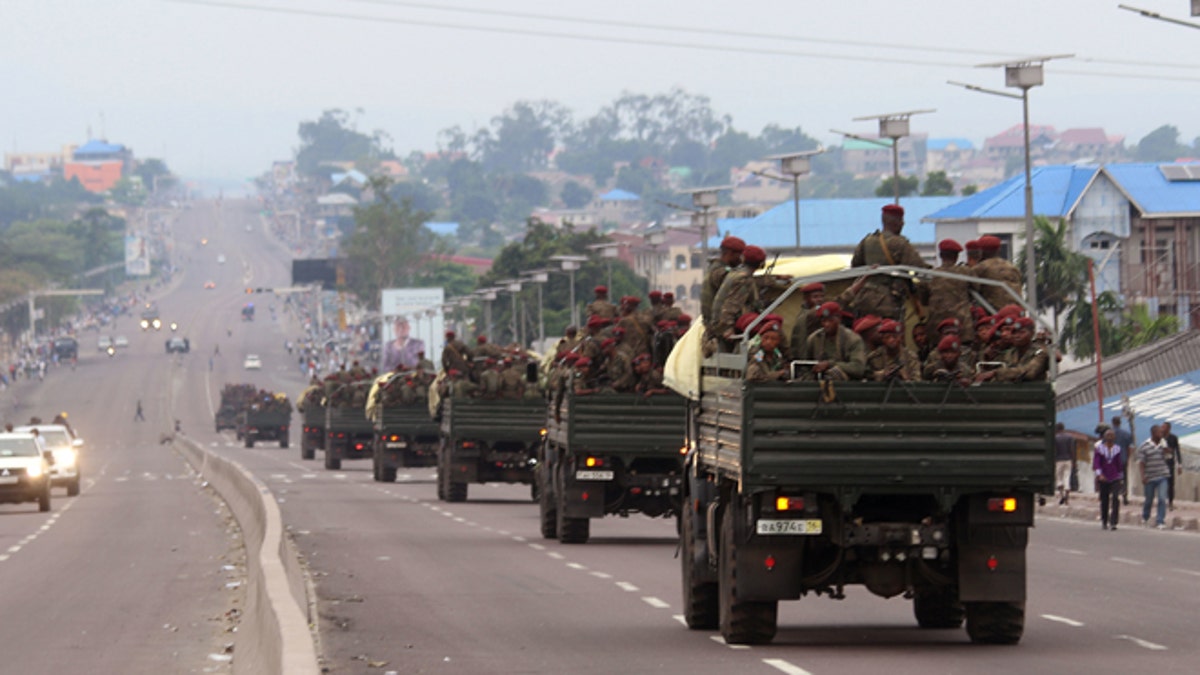
Congo military trucks carrying Congolese troops drive in a main street after violence erupted due to the delay of the presidential elections in Kinshasa, Democratic Republic of Congo, Tuesday, Sept. 20, 2016. (AP Photo/John Bompengo)
KINSHASA, Congo – More than 44 people have been killed in Congo in two days of street clashes between security forces and protesters against a delayed presidential election, a senior Human Rights Watch researcher said Tuesday, and several opposition party buildings were burned.
Thousands took to the streets of Congo's capital, Kinshasa, on Monday to oppose an election delay which they call an effort by President Joseph Kabila to stay in power beyond the end of his mandate in late December.
A high court has determined Kabila can stay in office until a new leader is elected. The electoral commission has filed for a delay in elections that were scheduled for November, saying voter registration lists will not be ready.
Gunshots could be heard Tuesday in Kinshasa as tensions rose.
Human Rights Watch has received credible reports from witnesses that security forces have killed at least 37 civilian, said senior Africa researcher Ida Sawyer.
"Most were killed when the security forces fired on crowds of protesters. Others were killed when the security forces burned down opposition party headquarters last night," she said in an email.
Protesters killed at least six police officers and a supporter of Kabila's party, she said, adding that demonstrators also burned and looted several shops and police stations.
The U.N. human rights office noted reports of "excessive use of force" by both security forces and demonstrators. Both sides denied responsibility for the violence.
An organizer of the opposition protests, Joseph Olengankoy, earlier had put the toll at more than 25 people killed. Interior minister Evariste Boshab had said 17 were killed, including at least three police officers.
At least two people were killed after attacks on the headquarters of five opposition parties late Monday, the U.N. and an opposition party said.
Bruno Tshibala, spokesman for the largest opposition party, said five were wounded in raids on four party headquarters.
"We will seek international justice," he said.
Congo's government spokesman, Lambert Mende, condemned the burning of opposition party buildings as well as attacks on other buildings, including two ruling party buildings and a school, by opposition protesters.
Mende called on Congolese to regain their composure and let justice do its work.
"The government can only condemn this mob justice mentality," he said.
Kabila, who came to power after his father's assassination in 2001, has yet to announce whether he will pursue another term in office, though the constitution prohibits it.
The violence comes amid growing fears that the election delay could lead to prolonged unrest in Congo, a nation as vast in size as Western Europe. The mineral-rich but largely impoverished country suffered back-to-back civil wars until 2003, and previous instability has drawn in armies from neighboring countries.
Appeals for calm and restraint have been launched by the United Nations, Belgium, the U.S., France and the European Union, which also have called for a rapid organization of presidential elections.
Amnesty International called on authorities to "take immediate steps to halt this escalating tension."
